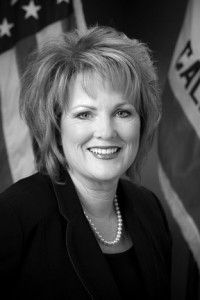Initiative Would Bring Back Part-Time Leg
JAN. 24, 2012
By KATY GRIMES
A ballot initiative planned for the November ballot could result in fewer bills coming out of the Capitol, potentially saving California taxpayers and business owners “tens of millions of dollars.”
Despite widespread disapproval of the Legislature’s performance, every bill attempting to change the system from inside of the Legislature is immediately killed.
Watching this first hand and desiring to make California’s Legislature part-time, Assemblywoman Shannon Grove, R-Bakersfield, co-authored a ballot initiative with The People’s Advocate founder Ted Costa, renowned for the Gray Davis recall.
The initiative would create a three-month, 90-day session at the state capitol, and reduce salaries for individual lawmakers from the present $7,940 monthly to $1,500 monthly. The annual salary would go from $95,291, down to $18,000, thus allowing legislators to hold a private-sector job at home in the district.
The new proposal would prohibit legislators from accepting state employment or appointment to a state government position for five years after they leave the Capitol.
“Politicians will spend less time driving business and jobs out of California,” said Grove. “They will spend less time in the state Capitol with special interests and lobbyists, and more time in their own districts.”
This state has had a full-time legislature since 1966 when voters approved the change. However, the annual cost to support the full-time Legislature has risen to $256 million, and created a culture of professional politicians — the direct opposite of a citizen-Legislature.
Grove said too many of the state politicians live in a bubble and work entirely in the political realm, disconnected from the world of taxpayers and the millions of private-sector businesses.
Critics
“California should definitely get rid of the full-time legislature; it is an experiment that has not worked and has not led to better lawmaking; if anything it has led to worse,” wrote Tony Quinn, long-time political writer and analyst, in December. But Quinn doesn’t like the proposed plan. “The Shannon-Costa 90-day part-time version is nuts. They need to go back to the drawing board and come up with something that makes sense.”
Quinn said that legislators will not be able to put together a budget in that short period, so Gov. Brown’s Finance Department will end up writing the state budget and it will be passed with little public oversight or input.
Legislative Analyst’s Review
A new report by the state’s Legislative Analyst’s Office found that the salary reductions would save the state $9.2 million annually, and the other cost savings would run into “tens of millions of dollars” annually.
But Grove asked, “Why stop there?” Despite the strong LAO estimate, Grove said the analyst’s office should take an even deeper look at more savings potential if the Legislature is no longer full time. “If the LAO looked at the cost of thousands of bad bills, we would save hundreds of millions of dollars.”
It’s not just the cost savings on legislators’ salaries, which is substantial, according to the LAO. The savings to businesses that no longer have to change their business plan and taxing structure every year to adjust to new legislation will be substantial, said Grove. “And, state agencies would be on a two-year budget.”
As for the critics of a part-time Legislature who claim that lawmakers wouldn’t be able to get their jobs done on a reduced schedule, Grove said that’s hooey. “Look at all of the gut-and-amend bills they jam through in the last three days of the session.”
Grove’s initiative will limit legislators to working no more than 95 days per year. According to Grove, legislators already work 80-95 days each year. “But it gets expensive with the per diem they accumulate just for showing up,” Grove said. “They collect $141 and some change just for showing up, saying the ‘Pledge of Allegiance’ and a prayer,” she said. “Do you earn an extra $50,000 tax-free every year?” she asked.
Add in the per diem pay with travel reimbursements and lawmakers are paid very well for what many do not consider a full-time job.
Where the hard costs will be realized is not in the amount of time legislating, but in the costs associated with travel, dining, rent and “other” reimbursable expenses, said Grove.
Live and Work In the District
Despite critics who say that the idea is irresponsible, and that it would weaken lawmakers’ oversight over public services, Grove insists that the state would be better off with less legislator time in the Capitol and more time at home in the district. “They should have to live and work among their constituents, with a real job, and most importantly, living under the laws they pass,” Grove added. Her initiative would help reduce the “political class” power structure controlled by a small number of people.
“We used to have a part-time legislature back in the 1960s when we were the [world’s] fifth largest economy,” said Grove. “Now California has dropped to the eighth largest economy. Texas has a part-time Legislature, Florida does it. Those are very large economies and they work on a part-time basis.”
Most of the states pay lawmakers less than half of what California legislators are paid. Some pay much less than that: Nevada pays just $137.90 per day for a maximum of 60 days of session. New Hampshire pays $200 for a two-year term. Alabama pays $10 per session day. Texas pays $7,200 per year. And New Mexico only pays for legislators’ expenses; there’s no salary.
The big union-dominated states pay closer to California’s legislative wages, but not as high. Pennsylvania pays $78,314 per year. New York pays $79,500 per year. And Michigan pays $79,650 per year. Even Wisconsin, with the union riots at the Capitol last year, only pays legislators $49,943 per year.
While Grove in the measure did not address the exorbitant cost of legislative staff, many whom receive six-figure salaries, Grove said without a full-time Legislature, the number of full-time staff will diminish as well. “As will the number of police needed to guard the Capitol, and so on,” Grove said. “And those savings should continue year after year.”
Related Articles
Does supermajority portend Maldonado-style gamesmanship?
Nov. 9, 2012 By Chris Reed In 2009, state Sen. Abel Maldonado made Democrats in the Legislature jump through an
Obama misrepresents immigration bill
June 12, 2013 By John Seiler I read President Obama’s speech yesterday on the immigration reform bill. He said some
Average Joe seat on state commission filled by the well-connected
Stockton’s Anthony and Rima Barkett were hosting a fabulous party in Rome in 2007 to discuss what the world could




